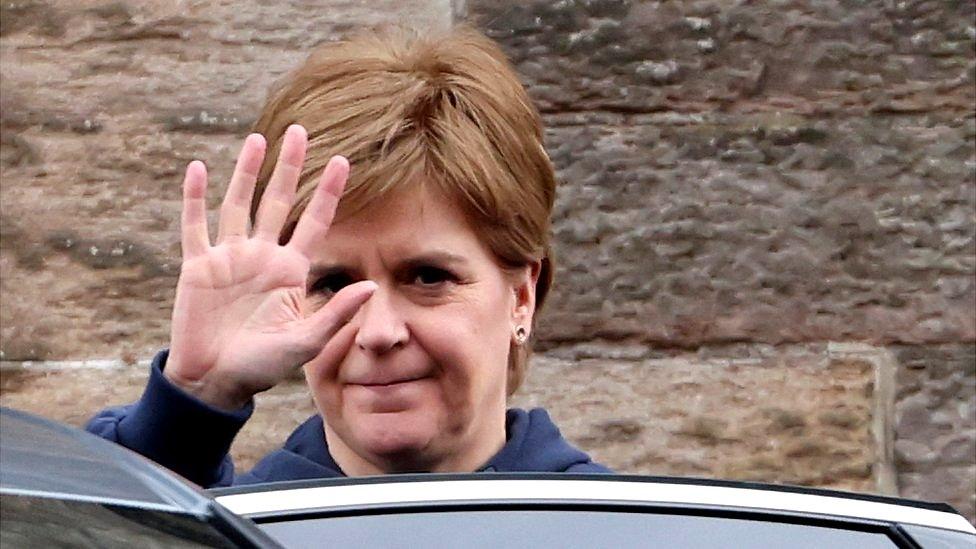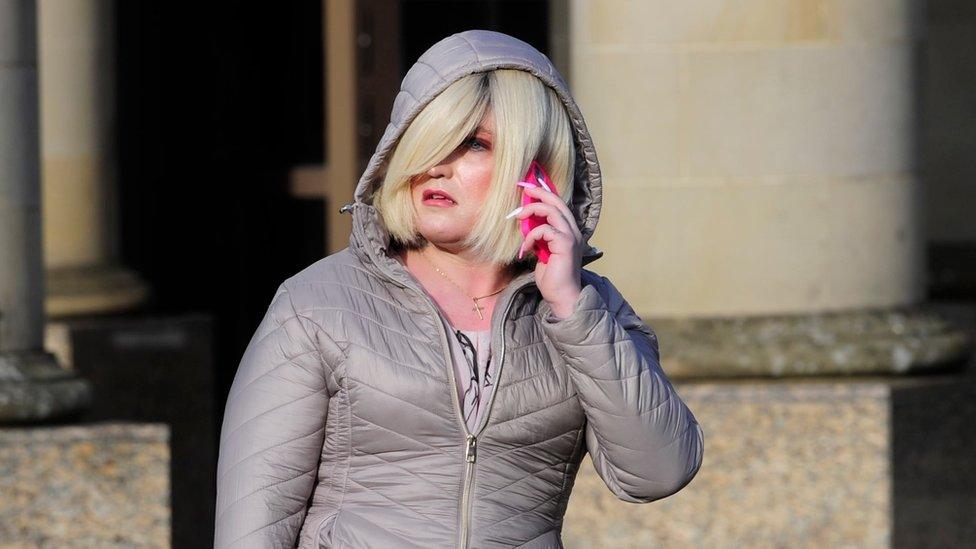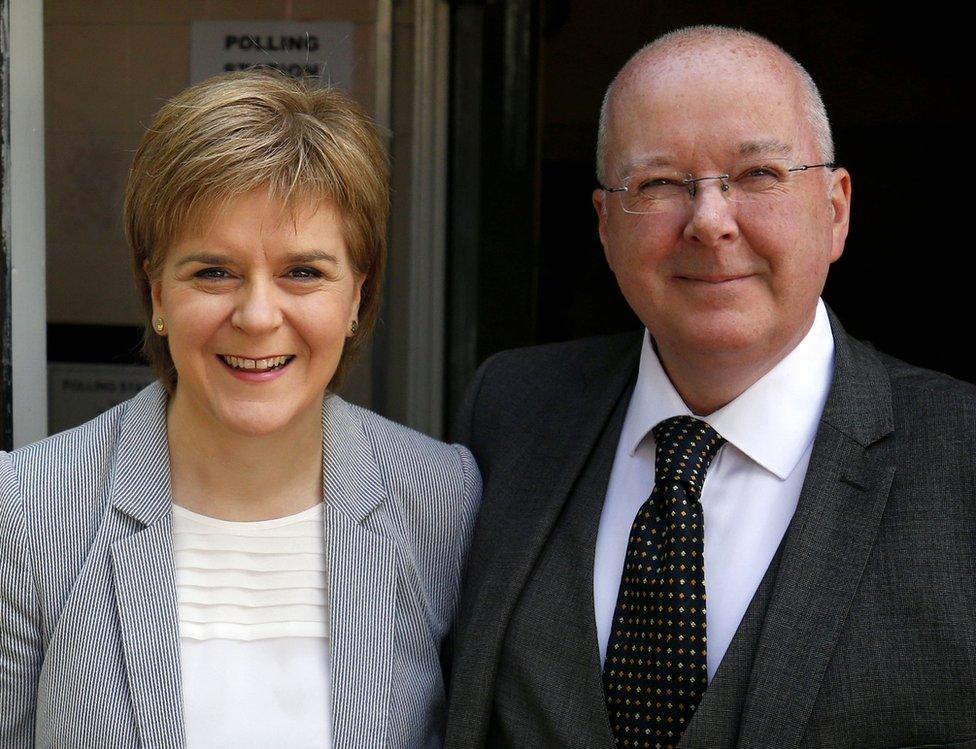Why did Nicola Sturgeon resign as first minister?
- Published

"In my head and my heart, I know that time is now."
Nicola Sturgeon caught everyone out on Wednesday when she announced her intention to resign as first minister of Scotland.
She said the funeral of independence activist Allan Angus on Tuesday had cemented her decision.
Although her Bute House address detailed her state of mind in coming to her decision, it left many wondering why she had chosen to go now.
There are several factors that could have influenced her decision, with the first minister having to deal with tricky political situations on a number of fronts in recent weeks.
Most of these will now be inherited by her successor once the SNP picks a new leader.
Independence
"We are at a critical moment," Nicola Sturgeon said of the independence movement.
With the campaign for a second referendum - and ultimately its goal of creating an independent Scotland - appearing to be at something of an impasse, the SNP needs to decide what to do next after the Supreme Court ruled it cannot hold an independence referendum without the UK government's consent.
Ms Sturgeon favours using the next Westminster election as a de facto referendum but some senior party member have raised concerns about this strategy.
The cause of independence is so much bigger than any one individual. All of us who believe in it contribute in different ways, at different stages of our lives.
Ms Sturgeon said she realised that her view as leader would carry enormous, probably decisive, weight in the debate.
And she said standing aside would allow the party to come to a decision on the best way forward without having to consider the potential impact on her leadership.
Gender Reform
When MSPs voted in December to pass the Gender Recognition Reform bill by 86 votes to 39 it marked a key staging point which had involved hours of debate, months of division and years of passionate campaigning on both sides.
Shouts of "shame on you" from some protesters in the public gallery came alongside cheers and a standing ovation from others, summing up the split in opinion.
Nicola Sturgeon said the bill was "about reforming an existing process that is degrading and traumatic for trans people, seeking to make it less traumatic for those who want to legally change their gender".
However, opponents - including some within the SNP - say the new law would conflict with the UK-wide Equality Act by, for example, making it more difficult for women-only spaces to exclude people who were born biologically male.
The UK government has blocked it from receiving royal assent - a move unprecedented in the history of devolution.
Ms Sturgeon had pledged to challenge the UK government in court, despite a recent poll suggesting that many people in Scotland believe it was right to block the reforms, external.
There has been speculation that whoever replaces Ms Sturgeon could choose to quietly shelve the plan to take legal action.
Transgender prisoners row

Isla Bryson is facing a custodial sentence for raping two women
With the worst possibly timing, the row over transgender prisoners blew up almost immediately after Westminster stepped into the gender recognition law process.
The outcry over the decision to place double rapist Isla Bryson in a women's prison saw the first minister face some uncomfortable broadcast interviews and parliamentary exchanges on Bryson, who she refused to refer to as either a man or a woman.
The first opinion polls conducted since the Bryson row suggested a negative impact for the SNP, Ms Sturgeon and the cause of independence.
Strikes
Growing unrest within the public sector over pay is an ongoing issue.
Teaching unions rejected a new pay deal on Wednesday. The NHS is limping through unprecedented winter pressures but has agreed to suspend strike plans while talks continue. Inflation remains high and budgets are squeezed at every level.
With councils about to set budgets, increase council tax rates and potentially make cuts to services and staff, this is another significant hurdle for the incoming leader.
The Peter Murrell loan

Nicola Sturgeon and her husband Peter Murrell, who loaned £100,000 to the SNP
Questions have mounted over a loan of more than £100,000 that Peter Murrell - the SNP's chief executive and Ms Sturgeon's husband - gave to the party in June 2021 to help it out with a "cash flow" issue after the last election.
In recent weeks, Ms Sturgeon was quizzed on the origin of finances used by her husband but said the funds were entirely his own and she could not recall when she first learned of it.
The SNP has also been under investigation over the past 18 months after questions were raised about the fate of £600,000 that was raised from supporters in 2017 for the purposes of a future referendum campaign.
She's had enough
After six years in the top job, New Zealand PM Jacinda Ardern bowed out last month, citing burnout and not having "enough in the tank" to lead.
Ms Sturgeon insisted at the time that she still had "plenty left in the tank". However, after eight years as first minister, seven more as deputy and a lifetime in politics, she did not deny during her resignation press conference that it had taken its toll.
Giving absolutely everything of yourself to this job is the only way to do it. The country deserves nothing less. But in truth that can only be done, by anyone, for so long.
"A first minister is never off duty," she said, pointing out that in this era there is "virtually no privacy".
She said going for a coffee with friends or for a walk on her own was difficult and that there was an increased "brutality" to life as a politician.
And she also mentioned wanting to spend more time with her niece and nephews.
The good of the party
"For every person in Scotland who loves me, there is another who might not be quite so enthusiastic," Ms Sturgeon said during her resignation speech, acknowledging that people have had a long time to fix their opinions of her.
With no shortage of controversy during a long career - including the ferry scandal, the Holyrood inquiry into the handling of the Alex Salmond sexual harassment complaints, the gender reform debate and the independence debate - she said fixed opinions about her were being used as "barriers to reasoned debate".
She said she believes that a new first minister might help people see more clearly that the SNP "is full of talented individuals" and demonstrate that no one individual should be dominant in any system for too long.